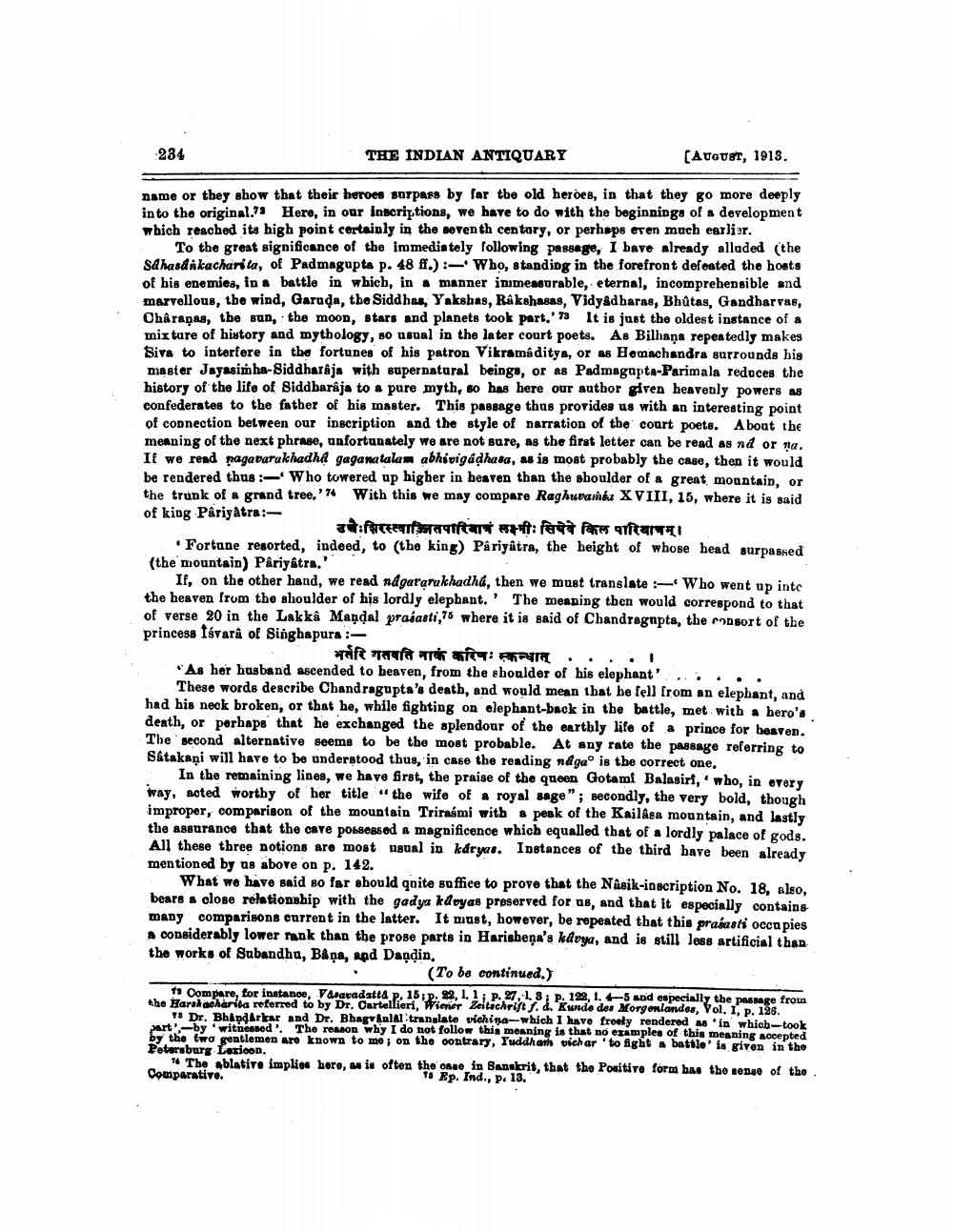________________
THE INDIAN ANTIQUARY
[AUGUST, 1913.
name or they show that their heroes surpass by far the old heroes, in that they go more deeply into the original.73 Here, in our inscriptions, we have to do with the beginnings of a development which reached its high point certainly in the seventh century, or perhaps even much earlier.
234
To the great significance of the immediately following passage, I have already alluded (the Sahasankacharita, of Padmagupta p. 48 ff.):- Who, standing in the forefront defeated the hosts of his enemies, in a battle in which, in a manner immeasurable, eternal, incomprehensible and marvellous, the wind, Garuda, the Siddhas, Yakshas, Rakshasas, Vidyadharas, Bhútas, Gandharvas, Chârapas, the sun, the moon, stars and planets took part.' 73 It is just the oldest instance of a mixture of history and mythology, so usual in the later court poets. As Bilhana repeatedly makes Siva to interfere in the fortunes of his patron Vikramaditya, or as Hemachandra surrounds his master Jayasimha-Siddharaja with supernatural beings, or as Padmagupta-Parimala reduces the history of the life of Siddharaja to a pure myth, so has here our author given heavenly powers as confederates to the father of his master. This passage thus provides us with an interesting point of connection between our inscription and the style of narration of the court poets. About the meaning of the next phrase, unfortunately we are not sure, as the first letter can be read as nd or na. If we read nagavarakhadha gaganatalam abhivigáḍhasa, as is most probably the case, then it would be rendered thus:- Who towered up higher in heaven than the shoulder of a great mountain, or the trunk of a grand tree.'74 With this we may compare Raghuvaméz XVIII, 15, where it is said of king Pâriyatra:
उच्चैः शिरस्त्वाज्जितपारियात्रं लक्ष्मीः सिषेवे किल पारियात्रम् ।
Fortune resorted, indeed, to (the king) Pâriyâtra, the height of whose head surpassed (the mountain) Pâriyâtra.'
If, on the other hand, we read nagararakhadhá, then we must translate :- Who went up inte the heaven from the shoulder of his lordly elephant. The meaning then would correspond to that of verse 20 in the Lakkâ Mandal prasasti,75 where it is said of Chandragupta, the consort of the princess Isvara of Singhapura:
भर्तरि गतवति नाकं करिणः स्कन्धात्
"As her husband ascended to heaven, from the shoulder of his elephant'
These words describe Chandragupta's death, and would mean that he fell from an elephant, and had his neck broken, or that he, while fighting on elephant-back in the battle, met with a hero's. death, or perhaps that he exchanged the splendour of the earthly life of a prince for heaven. The second alternative seems to be the most probable. At any rate the passage referring to Sátakani will have to be understood thus, in case the reading naga is the correct one.
In the remaining lines, we have first, the praise of the queen Gotami Balasirf, who, in every way, acted worthy of her title "the wife of a royal sage"; secondly, the very bold, though improper, comparison of the mountain Trirasmi with a peak of the Kailasa mountain, and lastly the assurance that the cave possessed a magnificence which equalled that of a lordly palace of gods. All these three notions are most usual in karyas. Instances of the third have been already mentioned by us above on p. 142.
What we have said so far should quite suffice to prove that the Nâsik-inscription No. 18, also, bears a close relationship with the gadya kavyas preserved for us, and that it especially contains many comparisons current in the latter. It must, however, be repeated that this prasasti occupies a considerably lower rank than the prose parts in Harishena's kavya, and is still less artificial than the works of Subandhu, Bâna, and Dandin,
(To be continued.)
1 Compare, for instance, Vasavadatta p. 15, p. 22, 1. 1 p. 27, 1.8 p. 122, 1. 4-5 and especially the passage from the Harshacharita referred to by Dr. Cartellieri, Wiener Zeitschrift f. d. Kunde des Morgenlandes, Vol. 1, p. 126.
13 Dr. Bhandarkar and Dr. Bhagvanlal translate vichina-which I have freely rendered as 'in which-took part-by witnessed'. The reason why I do not follow this meaning is that no examples of this meaning accepted by the two gentlemen are known to me; on the contrary, Yuddham vichar 'to fight a battle' is given in the Petersburg Lexicon.
74 The ablative implies here, as is often the case in Sanskrit, that the Positive form has the sense of the Comparative. 10 Ep. Ind., p. 13.




